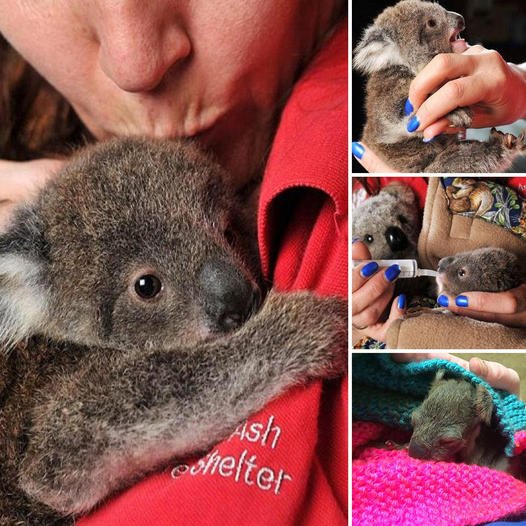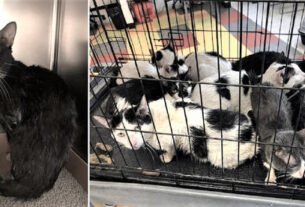Darwin, a baby koala, is on the lookout for a new friend after being taken to the Southern Ash Wildlife Shelter in Rawson, 20 km east of Melbourne. The little joey, weighing just 250 grams, was orphaned when timber workers failed to spot him and his mother in a tree they were cutting down. Fortunately, Darwin was rushed to Colleen Wood, a koala expert, who has been caring for him tirelessly over the past two months.
A Mother’s Love: The Secret to Darwin’s Survival
“Koalas are incredibly maternal, and often, the mother will fall in a way that protects the baby over herself,” says Wood. “This is likely how Darwin survived.” Now, at five months old, Darwin has almost doubled in weight, thanks to a special feeding routine every four hours. He may be inseparable from his teddy bear, George, but Wood knows it’s time to find him a real companion to teach him the survival skills he’ll need in the wild.
“It’s quite funny,” Wood laughs. “People see me feeding him and stare at the teddy bear, looking confused. Then I tell them, ‘No, there’s a real koala under there, behind George!’”
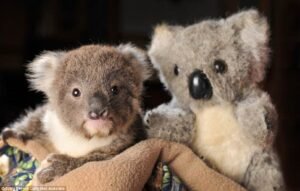
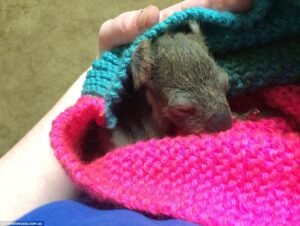
A Journey Back to the Wild
Darwin will remain under close supervision at the shelter for another 10 months before being released into the wild to fend for himself. Wood and the Southern Ash Wildlife Shelter volunteers will tag him, along with other koalas, to track their progress in their natural habitats.
“There’s nothing more rewarding than seeing a female you’ve cared for since she was a joey have young of her own in the wild,” says Wood. According to her, about 78% of injured or orphaned koalas that are released survive.
However, challenges remain. “We try to release them near their original habitat, but it can be problematic. We’ve seen koalas return to bushfire-damaged areas or fall from weak branches. And we have issues with cows—they hate koalas and will stomp on them if they can. Not to mention the chlamydia disease they catch from other animals, which is horrific.”
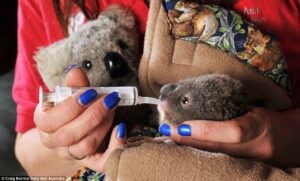
The Ongoing Struggle for Koalas
Wood, who has been caring for injured wildlife for 19 years, emphasizes that habitat destruction, wildfires, and climate change pose the biggest threats to koalas. “We don’t know enough about koalas in Victoria, and that’s a major concern. We need more research.”
When Darwin first arrived at the shelter, he required feeding every four hours because his stomach wasn’t yet developed to process eucalyptus leaves. “He was borderline when he came in,” Wood shares. “We usually wouldn’t accept joeys under 250 grams because they rarely make it, but Darwin is thriving, almost doubling in weight.”
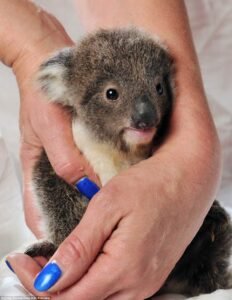
A Growing Number of Orphaned Joeys
With joey season starting early, Wood expects an influx of baby koalas due to road accidents, dog attacks, tree felling, and bushfires. “Last year, more than 200 baby koalas came into the center, and that number is rising,” she says.
For now, Darwin continues to enjoy his padded, heated tree fork, set to the temperature of his mother’s pouch. Soon, he’ll be paired with an adult female koala to help him learn to socialize and adapt to life in the wild.
“He’s a very lucky boy,” Wood says with a smile. “He’s going to be just fine.”
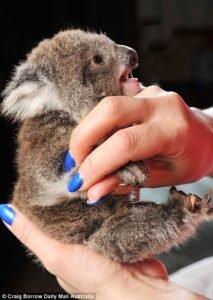
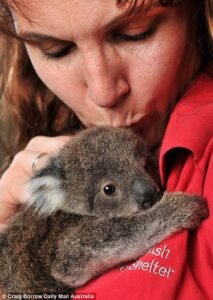
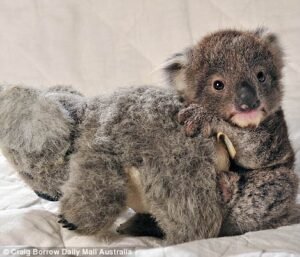
Darwin and His ‘Inseparable’ Companion George
Caring for little Darwin, who is now happily munching on eucalyptus leaves like a true koala.
